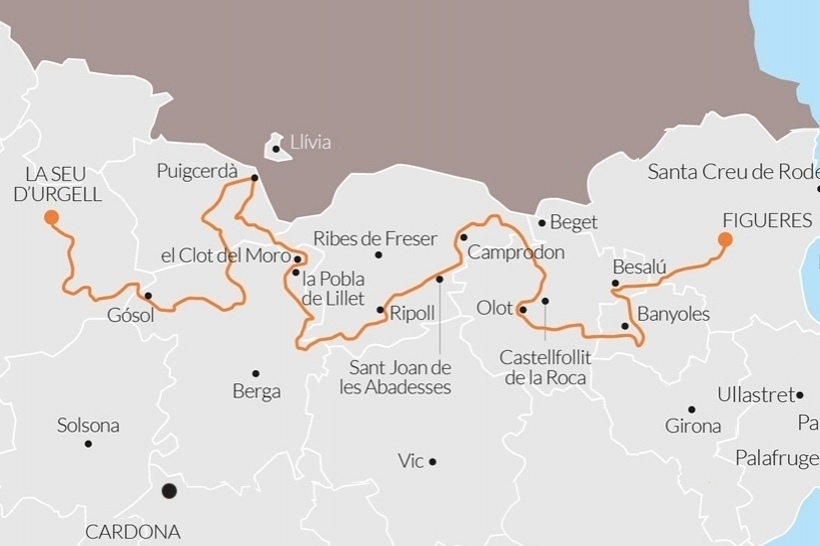Grand Tour of Catalonia - Section 4. Ode in nature: from La Seu d'Urgell to Figueres

This route is designed to be done by electric vehicle, although it can be done with any other car. Along the route we will suggest municipalities that have charging points and places of interest to visit while we charge batteries.
Electric cars are a good way to decarbonise road transport These vehicles do not emit greenhouse gases and do not need fossil fuels to run, which which makes them a viable option to help reduce our CO₂ footprint.The constant improvement in the technology of these cars makes them increasingly efficient and ecological.
Consult also the recommendations when traveling by electric car.
5
Number of sections
357
Total kilometers
The Grand Tour de Catalunya is a journey full of travels. This circular route, inspired by the great journeys that the young people of the 17th century bourgeoisie made through Europe, proposes a rediscovery of the territory beyond the main icons of our land, so that you can enjoy its purest essence through the unique landscapes that it gives us, a unique identity and cultural heritage and a gastronomy that will make your taste buds vibrate.
The Grand Tour of Catalonia, which covers more than two thousand kilometers, is not designed to be done in a single section, unless you are one of the lucky few who in our current busy world, and have more than a month to be able to perform the. For this reason, this route offers you 5 different sections divided into several stages, where each stage is equivalent to one day. In this way, each traveler can organize the route to their liking, travel it at their own pace and at any time of the year.
The next stage will take you from the medieval Seu d'Urgell to the capital of surrealism, Figueres, where you will find the footprints of Dalí. Before, however, you will come across several unique natural wonders throughout the Peninsula, landscape icons loaded with symbolism and with a high identity value for the community: Pedraforca and the Garrotxa volcanoes. For the most foodies, this stage will be a good gift, since you can experience carving cabbage, black peas with bacon, fork and knife breakfasts... And as always, there will also be a place for culture.
Do you want to know more about this section of 5 stages and 357 kilometers ? Well, you just have to read carefully. Let's go!
You cannot miss:
- Pedraforca
- Medieval villages of the Pyrenees
- Besalú
- Dalí Museum
Route's villages
Stage 1: Views of Pedraforca
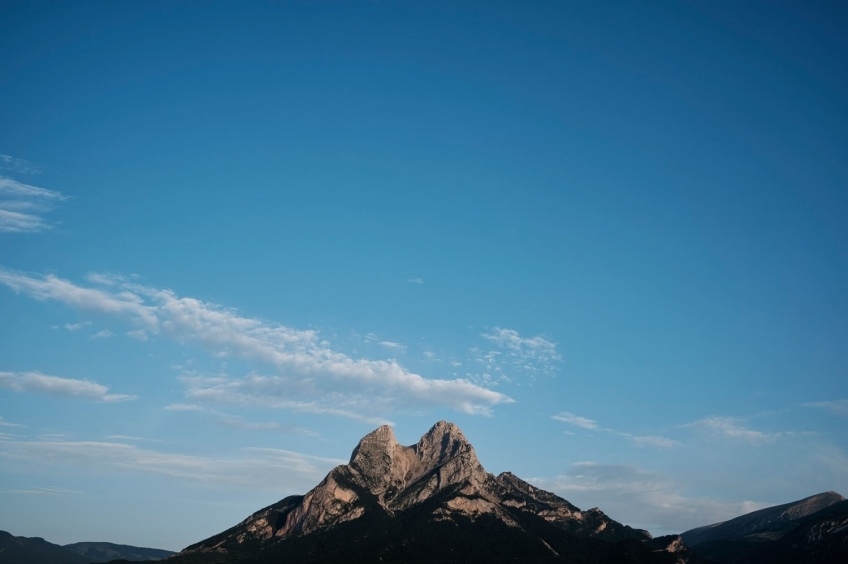
52 KM (Gósol)![]()
Next stops
![]() 27 KM (Guardiola de Berguedà)
27 KM (Guardiola de Berguedà)![]() 3 KM (Bagà)
3 KM (Bagà)
The first rays of sunlight caress the honey-colored walls of the villas you will pass along the way: Ges, Adraén, Fórnols, Cornellana or Tuixent, among others, picturesque stone villages whose inhabitants have become accustomed to living at altitude and in relative isolation. With the Seu d'Urgell at your back and heading towards Gósol , winding through the pine forests that mark the western limit of the Cadí-Moixeró Natural Park , you will arrive at this pastoral tranquility of the Berguedan mountain that attracted Pablo Picasso. Encourage yourself to investigate and discover what led this genius to this town and how this place inspired him to kick off his cubist stage. In addition to sketches, drawings and paintings, the artist filled out a small travel notebook, the Catalan Carnet, with notes, the reproduction of which is kept in the Centro Picasso de Gósol , a museum worth a visit.
Then, put on your hiking boots because the Grand Tour will take you around the perimeter of Pedraforca on a circular route of 17 kilometers and 790 meters of unevenness from where you will contemplate the four slopes of this stone colossus.
In the afternoon heading towards Bagà , the end of the stage, make a brief stop at Guardiola de Berguedà to visit the magnificent Benedictine monastery of Sant Llorenç. To end the day, nothing better than a good and well-deserved dinner based on local recipes: black peas with bacon, masked potatoes with black sausage and potatoes with cabbage among other dishes that will delight you.
![]()
Need to recharge?
Saldes (62 Km – 10 Km past Gósol)
Meanwhile... Even if you're short on time, Saldes offers captivating spots. You can visit Saldes Castle or simply enjoy the peace and charm of this mountain hideaway. If you'd prefer to take things at a more leisurely pace, explore the hiking trails, discover the nature and history, visit the Monastery of Sant Sebastià del Sull or, if you're fascinated by prehistory, don't miss the Molers dolmen, an impressive collective funerary monument dating from 1800–1400 BC. Recently restored, it transports you to the era of your ancestors.
Guardiola de Berguedà
![]()
Next stops
21 KM (Bellver de Cerdanya)
![]() 17 KM (Puigcerdà)
17 KM (Puigcerdà)
![]() 7 KM (Llívia)
7 KM (Llívia)
![]() 24 KM (Meranges)
24 KM (Meranges)
![]() 9 KM (Refugi de Malniu)
9 KM (Refugi de Malniu)
![]() 35 KM (Castellà de n'Hug)
35 KM (Castellà de n'Hug)
![]() 57 KM (Ripoll)
57 KM (Ripoll)
Stage 2: Altitude villages
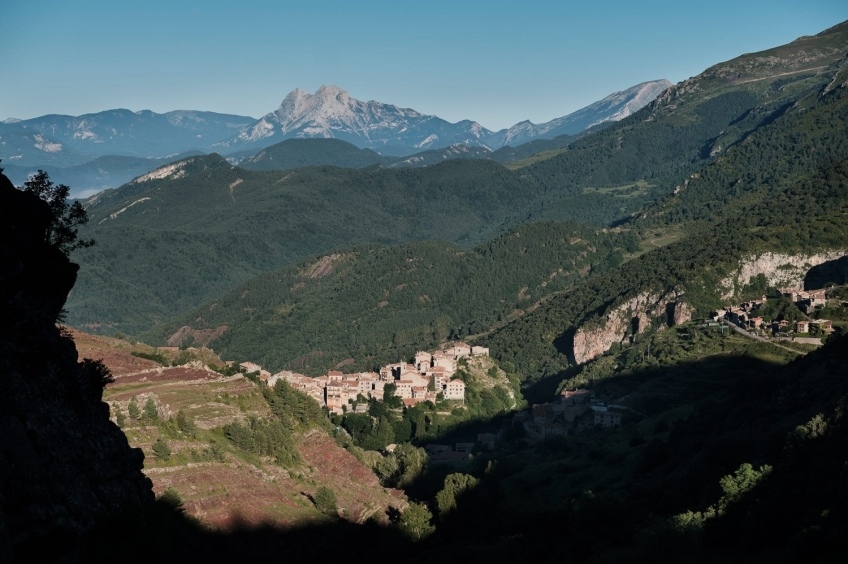
Throughout the whole of Cerdanya you will visit small villages with rustic mountain architecture and taste high quality sausages before continuing to Castellar de n'Hug to see the sources of the river Llobregat. You will end the stage after 128 kilometers, arriving at Ripoll.
Today's stage begins by following Cerdanya, with its 17 municipalities located above a thousand meters of altitude . The first stop will be Bellver de Cerdanya . Guess which famous writer wrote the legend of The Devil's Cross inspired by the town and the whole area? You will surely discover it by walking through the town, visiting the medieval center of the town and walking to the neighboring church of Santa María de Talló, one of the most important points on the Camino de Santiago.
Then, go up to the capital of the region, Puigcerdà , bordering the beautiful lake and wandering through the streets of the center following in the footsteps of one of Carlos Ruiz Zafón's novels . Follow local roads that lead to towns with short names and strong sausages, such as black and white bull and liver bread. After passing Urtx, Alp and Das, the Grand Tour will take you to Meranges , a town with perfect rustic mountain architecture and a beautiful lake, that of Malniu. Before, we recommend a short detour to Llívia to get to know one of the oldest pharmacies in Europe!
In the afternoon you cannot skip a visit to Castellar de n'Hug , known for its spectacular natural surroundings, for its Romanesque style and for the excessive size of its croissants. Also because the river that forms the backbone of all the regions of Barcelona is born here: the Llobregat. Put on your walking boots again because it's time to hike to the Llobregat fountains, where during the route, we promise that the landscape and the waterfalls will surprise you. Finally, set out again until you reach Ripoll, where you can spend the night.
![]()
Need to recharge?
Bellver de Cerdanya
Puigcerdà
La Molina (18 Km)
Meanwhile... In winter, the La Molina ski resort is a real classic in the Pyrenees for enjoying the snow and the mountains. If you prefer a more relaxed alternative, you can enjoy the small village and its natural surroundings. And with a little more time, you can discover the Paborde dolmen or follow the paths that lead into the woods and to viewpoints with spectacular views.
La Pobla de Lillet (30 Km from La Molina)
Meanwhile... While your car is charging, stroll through the cobbled streets of the old town, cross the Old Bridge – a single-arched Romanesque bridge – and visit the parish church of Santa Maria de Lillet. Delve into the Romanesque heritage by visiting the Monastery of Santa Maria de Lillet and the unique Church of the Rotunda of Sant Miquel. And if you're passionate about hiking, climb up to the Sanctuary of Falgars to enjoy stunning views of the valley.
Borredà (21 Km)
In the meantime... Enjoy a stroll through the old town and discover the Church of Santa Maria, surrounded by a large, charming square. Nearby, the Gorg del Salt awaits, a spectacular natural spot that invites you to relax and connect with nature. And if you enjoy walking, you can follow the trails that run alongside the Margançol and Merlès streams, or visit the church of Sant Sadurní de Rogers, which has been declared a Cultural Asset of National Interest.
Ripoll (27 Km from Borredà)
![]()
Next stops
14 KM (Ribes de Freser)
![]() 39 KM (Camprodon)
39 KM (Camprodon)
![]() 17 KM (Beget)
17 KM (Beget)
![]() 29 KM (Castellfollit de la Roca)
29 KM (Castellfollit de la Roca)
![]() 4 KM (Sant Joan les Fonts)
4 KM (Sant Joan les Fonts)
![]() 5 KM (Olot)
5 KM (Olot)
Stage 3: Active Tourism in Núria
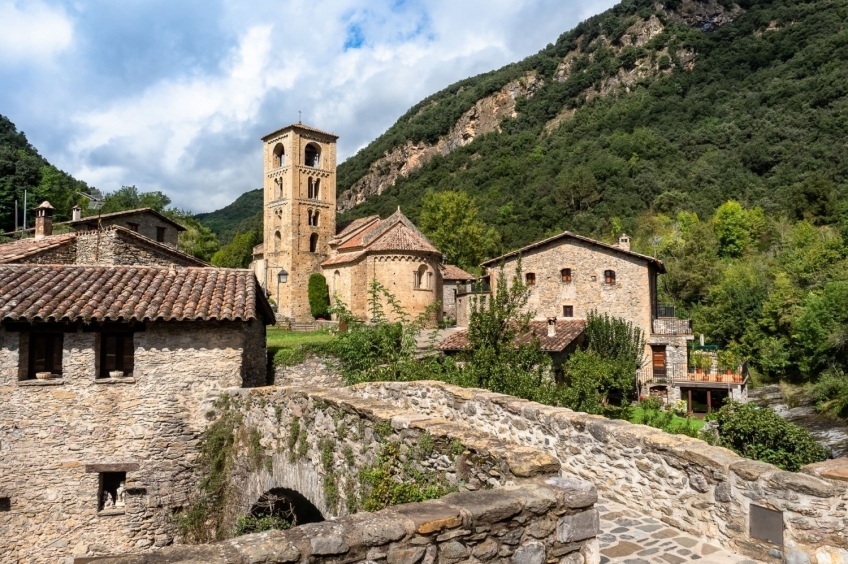
Already in Girona territory you will start your way through this stage that will transport you from Ripoll, with the impressive portal of Santa María to Olot, passing through incredible medieval towns like those in the movies and environments as symbolic as Vall de Núria. The third stage begins!
They say that breakfast is the most important meal of the day and this is known by the Grand Tour. As in previous stages and sections, this meal always has a very relevant role, so this time it invites you to enjoy a traditional fork breakfast: dried sausages, stewed meat and tomato bread are the protagonists on this occasion. . With a full belly, a visit to the center of Ripoll is the best way to digest breakfast. Come to the monastery of Santa María de Ripoll to contemplate carefully the majestic and iconic portal known as 'the stone Bible'.
Mark, now, on the GPS the coordinates to Ribes de Freser , where this time you will change vehicles. You will leave the car parked and you will get on the Núria rack railway that will take you twelve kilometers up between cliffs, mountains and gorges until you reach the Vall de Núria . Once at the top, contemplate the panoramic view of the valley: groves, green meadows, a lake and a small sanctuary in the middle of the stage, and in the background, some of the most emblematic Pyrenean peaks. There you can choose between several options to enjoy the valley. A hiking route on one of the hundreds of trails and routes adapted to all levels or an excursion on horseback.
On the way back and continuing with the route you will reach Camprodon . You can make a stop to cross the well-known medieval bridge and buy a box of artisan cookies that we like so much! Before reaching Olot, the end point of the route, you will run into medieval villages along the road that undoubtedly deserve a stop: Beget, Sant Joan les Fonts and the Castellfollit de la Roca hill.
![]()
Need to recharge?
Ribes de Freser
Sant Joan de les Abadesses (10 Km)
I mentrestant... Passeja pel nucli antic , i deixa't captivar pel Monestir romànic fundat per Guifré el Pilós i l'Emma —la seva primera abadessa. Endinsa't a la Vila Vella, amb la seva antiga muralla, els portals medievals i la plaça Major, on el Palau de l'Abadia acull avui el centre d'interpretació del Comte Arnau. Si tens una estona més, recorre la Via Verda de la Ruta del Ferro i del Carbó, que segueix l'antiga línia ferroviària, i gaudeix pel camí del gorg de Malatosca, un paratge natural ple d'encant lligat a la llegenda de les bruixes. Tot plegat, en un entorn on història i natura es donen la mà.
Camprodon (25 Km from Ripoll)
Beget
Sant Joan les Fonts
Olot
![]()
Next stops
5 KM (Parc Natural de la Zona Volcànica de la Garrotxa)
![]() 5 KM (la Fageda d'en Jordà)
5 KM (la Fageda d'en Jordà)
![]() 9 KM (Santa Pau)
9 KM (Santa Pau)
![]() 24 KM (Banyoles)
24 KM (Banyoles)
Stage 4: Flying over dump trucks
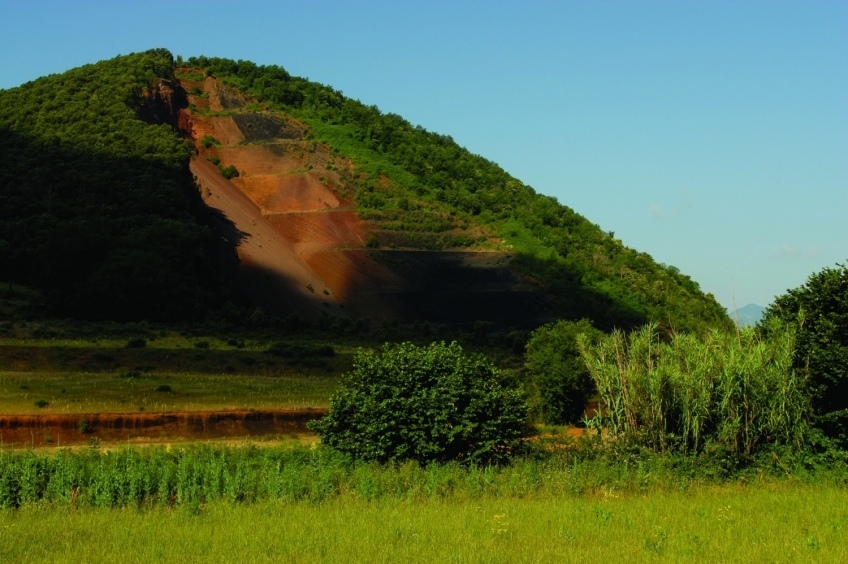
Although the distance is short, only thirty kilometers between Olot and Banyoles, this stage is one of the most intense in terms of emotions and sensations.
At this stage, we already anticipate that the alarm clock will ring very early in the morning. But calm down! This time getting up early is more than justified because the first activity of the day is a hot air balloon flight over the Garrotxa Volcanic Zone Natural Park , a unique place in the Peninsula with more than 40 volcanoes and dense forests of holm oaks, oaks and beech . Do you know the famous phrase 'a picture is worth a thousand words'? Well that. All the efforts we would make would be in vain to describe the landscape to you, that is why the Grand Tour invites you to live this experience in the first person. If you suffer from vertigo or you simply do not feel like a balloon flight, do not suffer beforehand, since the beauty of this place can also be enjoyed by bicycle along one of the sections of the Greenway of Carrilet de Olot or by taking an excursion to walk along any of the itineraries that pass between volcanoes. Once the activity is over and with a full belly after the post-flight breakfast, you will continue the route by taking a guided tour of the market and the centuries-old shops in the center of Olot, to familiarize yourself with the most characteristic products of the local gastronomy: pulses in bulk, cold cuts, chocolate and ratafía among others. At lunch time, we will stop in the town of Santa Pau to eat the authentic Santa Pau beans .
In the afternoon, let yourself get lost in a place to which Joan Maragall dedicated an entire poem: "A sweet oblivion of everyone takes hold, in the silence of that deep place", La Fajeda d'en Jordà , a beech forest that It grew over the lava field of the Croscat volcano. Before night falls, head towards Banyoles . There you will find several accommodation options, but one very particular: glamping. A campsite where instead of bungalows, its rooms will be curious transparent bubbles located in the middle of nature that will allow you to contemplate the starry sky from your bed.
![]()
Need to recharge?
Santa Pau
Sant Martí de Campmajor (15 Km)
![]() GI-524 (Municipality of Sant Miquel de Campmajor), 1
GI-524 (Municipality of Sant Miquel de Campmajor), 1
Meanwhile... While the car is charging, take the opportunity to head into the village centre and visit the Romanesque church of Sant Miquel, with its apse and Lombard buttresses, the focal point of village life. In the surrounding area, you can stroll by the ponds and the Sant Miquel stream, discover the Mill's sluice gate and delve into local history at the Roca Castle, which still retains its tower beside the Ser and Ritort rivers.
Banyoles (9 Km)
![]()
Next stops
13 KM (Besalú)
![]() 24 KM (Figueres)
24 KM (Figueres)
Stage 5: Dalí's cradle
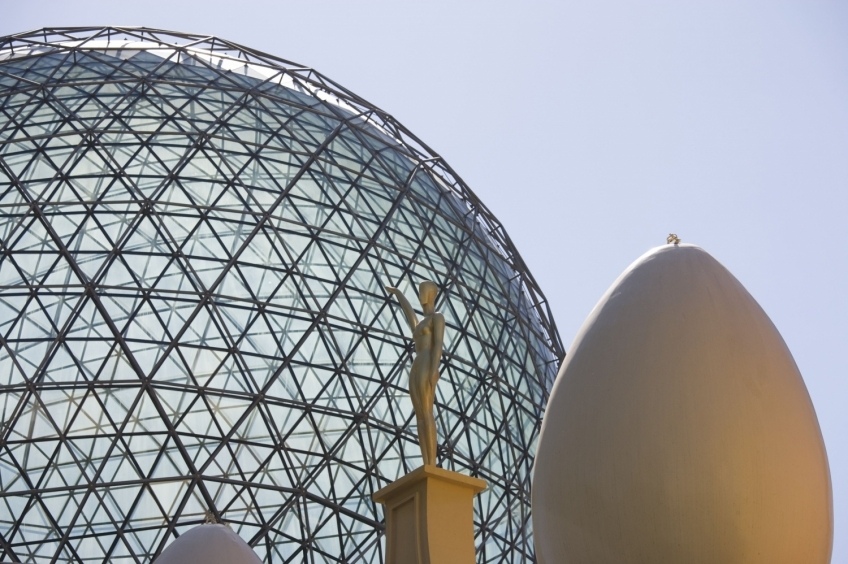
The last day of the section will take you from Banyoles, where you will see the beginning of the day with the first rays of sun on the lake, to Figueres , where you will immerse yourself fully in the universe of the surrealist genius Salvador Dalí . Along the 34-kilometer route, you will delve into history to learn about the Jewish and medieval legacy of Besalú.
Lush and green vegetation, the sound of water and a hypnotic landscape is what awaits you at Lake Banyoles. It is not surprising that all the bathtubs boast and it is that the images of pinkish and orange colors of sunrise over its waters early in the morning will leave an unforgettable image engraved on your retinas.
Although there are a thousand ways to enjoy the lake scenery, the best of them is through the Olympic spirit of '92, when the rowing sports of the Olympics were held on the pond. So then, we recommend you warm up your muscles a bit, do some stretching and get ready to kayak to discover the local fauna: storks, ducks, gray herons and a large number of species that live in it. Once on the mainland again, you will surely be struck by the old fisheries on the shores, some houses that served as much to store fishing utensils as bathhouses for the local bourgeoisie.
From Banyoles, the road runs through pine forests to the noble town of Besalú. You will know that you have reached the town because the magnificent Romanesque bridge over the Fluvià river, emblem of medieval Catalonia, will welcome you. The historic center and the Jewish quarter, the 13th-century Sephardic neighborhood that still preserves the synagogue and the micvé, are in an extraordinary state of conservation.
In the afternoon, continue on your way to Figueres, the birthplace of the genius Salvador Dalí. For dinner, enjoy a good meal on one of the terraces on the Rambla, where you will find some of the cafes where the adolescent Dalí spent many hours drawing. In one of them, the Cafe Emporium, the surrealist painter and his friend Luis Buñuel wrote the script for the short film Un chien andalou.
Go ahead and do the Grand Tour of Catalonia, enjoy the essence of our land in all its splendor like never before. For more information visit https://grandtour.catalunya.com/en/and if you dare to do it by electric car, visit https://grandtour.catalunya.com/ca/cotxe-electric/
Text and images Grand Tour de Catalunya.
You may also be interested in: Discover Catalonia by electric car | The Grand Tour of Catalonia: A catalan roadtrip
What to do
Where to eat
El Recó de l'Avi
Guardiola de BerguedàTypical homemade cuisine, with oak-grilled meats, a wide variety of tapas and…
Restaurant Dachs
Les Llosses (a 8.4 Km)Restaurant Dachs offers versatile spaces for celebrations in Les Llosses, with rustic…
Restaurant el Pont 9
CamprodonA restaurant serving humble and simple cuisine, where you can enjoy the…
Where to sleep
El Serradal
Sant Joan de les Abadesses (a 4.8 Km)Relax in a natural setting of meadows and forests, enjoying walks, hikes,…
Mas del Joncar
Sant Pere Pescador (a 13.3 Km)The farmhouse is located in Sant Pere Pescador surrounded by fruit fields,…
Càmping les Preses Natura
Les Preses (a 5 Km)Camping Les Preses Natura, located in the Natural Park of the Volcanic…
Related routes
Grand Tour de Catalunya - Section 5. From Surrealism to Modernism. From Figueres to Barcelona
I want to do this route by electric vehicle! This route is designed…

